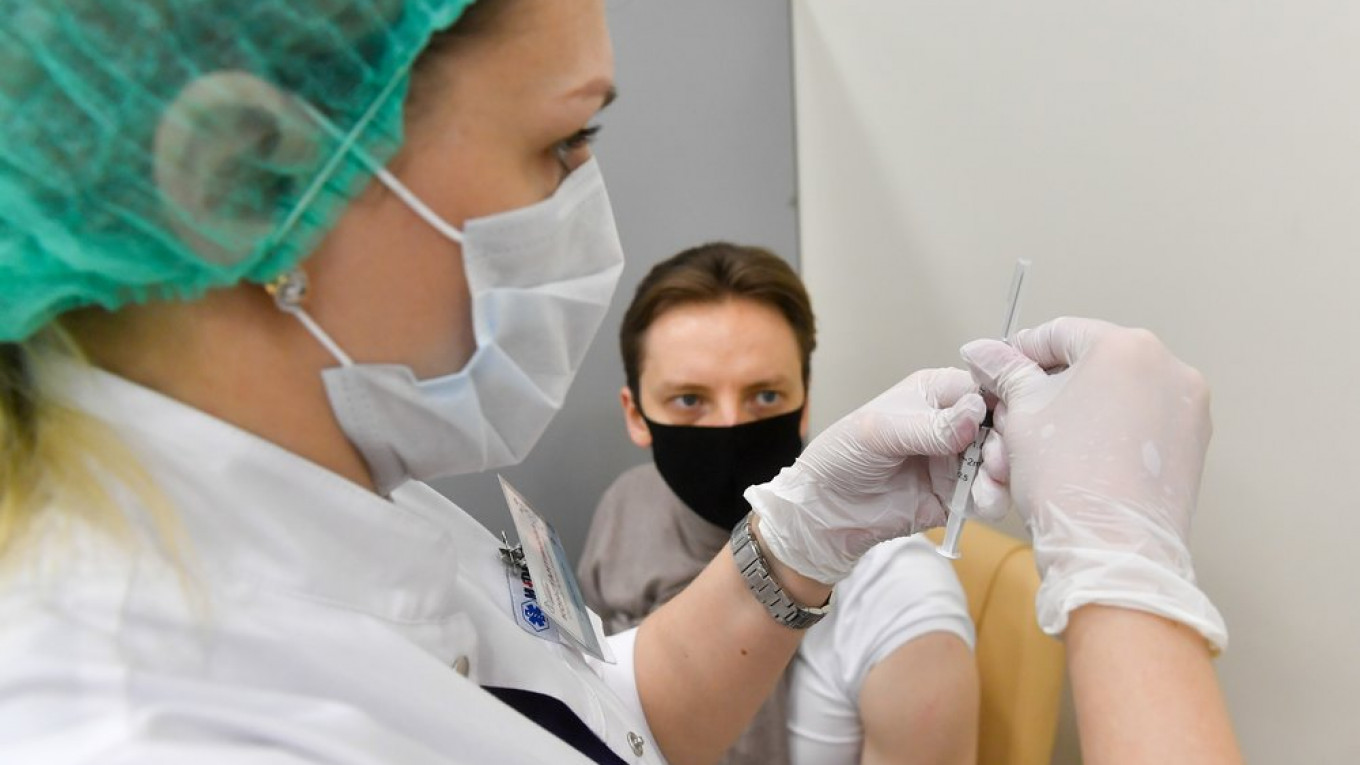Russia’s republic of Bashkortostan will introduce Covid-19 passports from Feb. 5, becoming the first region of the country to do so, Governor Radiy Khabirov announced.
The electronic document and an associated QR code will be automatically issued to residents with Covid-19 antibodies through the Gosuslugi.ru government portal.
“A person who received the vaccine would be issued a Covid-19 passport valid for one year, while those maintaining antibody test results with IgG levels above 10 [as a result of infection] will receive a three-month passport,” Sofya Aleshina, the head of the regional Health Ministry’s press service, told The Moscow Times.
Previously infected residents with antibody levels below the specified norm will only get the passport if they receive the coronavirus jab, Aleshina added.
Coronavirus passport holders will be exempt from certain pandemic restrictions, including social-distancing measures and self-isolation orders issued for at-risk groups.
“The only exception is the mask mandate. It remains in place even for vaccinated residents until at least the end of this year,” Khabirov said in his Monday announcement.
Document holders will also be eligible for discounts at regional retailers as well as sporting and entertainment venues. According to information obtained by Kommersant, the passport will allow for discounted bookings at local hotels and resorts, while passport-holding educators will be eligible for additional paid leave days.
‘Immunity discrimination’
The news has fed into a growing debate around whether such documents enable “immunity discrimination” against people who avoided the virus or are unable or unwilling to vaccinate.
Russia’s upper-house Federation Council head Valentina Matviyenko called the introduction of coronavirus passports for all Russian citizens “inappropriate.”
“Dividing people and granting unequal rights based on [coronavirus] vaccination results is also wrong,” Interfax quoted Matviyenko as saying at a Thursday press conference.
“Those who wish to do so can receive an electronic vaccination certificate. That would be an appropriate course of action. All other innovative solutions should be set aside as not to anger people.”
The Bashkortostan governor’s office dismissed discrimination concerns, saying that the coronavirus passport initiative is foremost aimed at motivating Bashkortostan’s residents to get vaccinated.
“Whether to use certain additional privileges offered [by the passport] is up to each individual,” a representative told The Moscow Times.
The press service did not confirm plans to extend the project or passport holders’ privileges beyond the region.
Aleshina, the regional Health Ministry spokesperson, confirmed that Bashkortostan has received 14,000 doses of Russia’s domestically developed Sputnik V coronavirus vaccine since the start of the country’s vaccination drive at the end of last year. Out of the republic’s population of over 4 million, approximately 7,000 people (0.17 percent) have received both doses of the vaccine so far.
“We cannot certainly predict [how many people will receive the vaccine in the near future]. We are waiting for a response and [vaccine] supplies from the federal government, but all vaccination centers here are ready.”
A Message from The Moscow Times:
Dear readers,
We are facing unprecedented challenges. Russia's Prosecutor General's Office has designated The Moscow Times as an "undesirable" organization, criminalizing our work and putting our staff at risk of prosecution. This follows our earlier unjust labeling as a "foreign agent."
These actions are direct attempts to silence independent journalism in Russia. The authorities claim our work "discredits the decisions of the Russian leadership." We see things differently: we strive to provide accurate, unbiased reporting on Russia.
We, the journalists of The Moscow Times, refuse to be silenced. But to continue our work, we need your help.
Your support, no matter how small, makes a world of difference. If you can, please support us monthly starting from just $2. It's quick to set up, and every contribution makes a significant impact.
By supporting The Moscow Times, you're defending open, independent journalism in the face of repression. Thank you for standing with us.
Remind me later.







